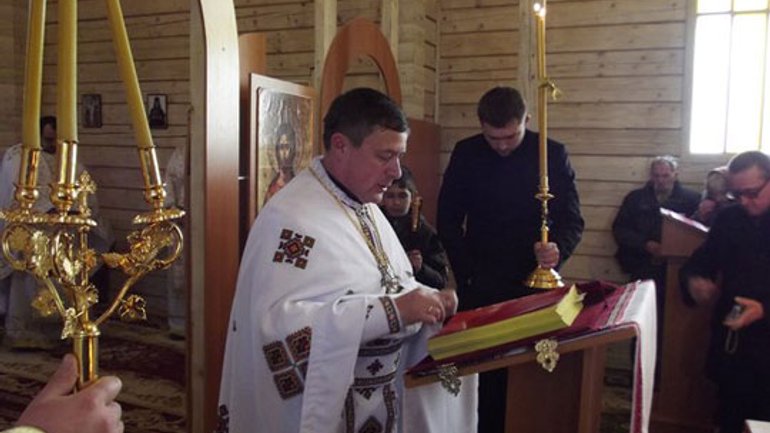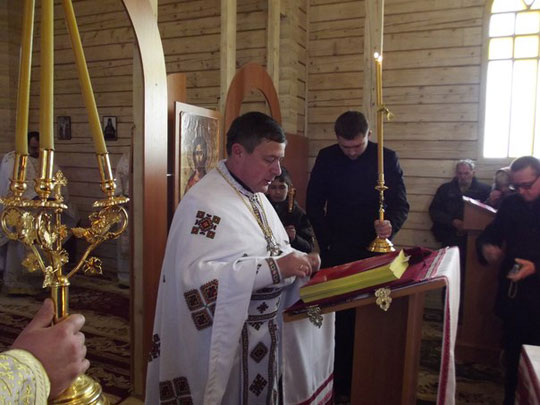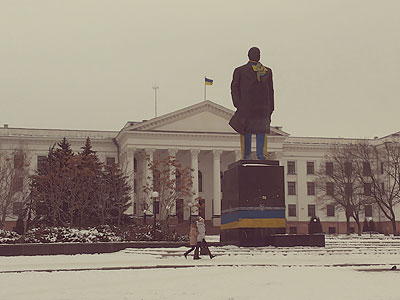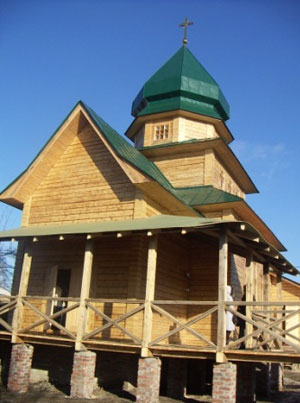PRIEST FROM KRAMATORSK: absence of uniform predominant culture is one of the factors that provoked today’s crisis in Donbas

 The Greek Catholic Church in Donbas has found herself in a difficult position. Local separatists consider it hostile. In the 90-ties, the western Ukrainians persecuted in times of the Soviet Union constituted the backbone of the Greek Catholic communities. Those who moved there as a result of ‘Operation Vistula’, or those who were forbidden to return home after the Soviet camps. Throughout almost the entire last century, these people settled in Donbas, working at its mines and factories. And immediately after the Greek Catholic Church was legalized, these people began to ask for their own priests.
The Greek Catholic Church in Donbas has found herself in a difficult position. Local separatists consider it hostile. In the 90-ties, the western Ukrainians persecuted in times of the Soviet Union constituted the backbone of the Greek Catholic communities. Those who moved there as a result of ‘Operation Vistula’, or those who were forbidden to return home after the Soviet camps. Throughout almost the entire last century, these people settled in Donbas, working at its mines and factories. And immediately after the Greek Catholic Church was legalized, these people began to ask for their own priests.
One of the first pastors was Father Basil Ivanyuk. He left his native Lviv and went to serve in Donetsk region in 1995. Now the priest is dean and of Kramatorsk deanery, serving at six parishes. These parishes during last spring and summer were occupied by terrorists from DNR. Father Basil tells what depresses a priest from the westof the country the most in eastern people,what problems Greek Catholic community faces in Donetsk region and what it has endured during the occupation of the DNR.
In 2006, the UGCC researched how many people in Donetsk and Luhansk regions, regardless of their religious affiliation were believers and went to church. The results showed that only 4%. "4% are the people who go anywhere: toCatholic, Orthodox, Greek Catholic or Protestant church. And 96% are people who may be educated anyone. Although nominally all of them are Christians here and are all baptized,” says Father Vasyl. One reason for such a small percentage, in his opinion, is the absence of any humanitarian policy of the state in the east. The priest calls gaps in education one of the major problems in Donbas.
“War would not have happened if the central government made at least something for education in these regions,” says the priest. He adds that for all his time in Donetsk region he has never seen it promote Ukrainian culture. According to the priest, the absence of dominant nationality or culture on the territory of Donbas is one of the reasons that caused the ongoing crisis. Father Vasylsays that the dominance of some of the cultures would allow forming lifestyle and coring values. And no matter if it is Ukrainian, Russian or Tatar culture. And, as a result, there appeared a potpourri that cannot be eaten,” said the pastor.
Even today, says Father Vasyl, anyone might approach to him on the street and ask: What is the difference between Greek Catholics and Christians? This is the question that shows all the decay of society. The priest does not explain, because he has too little time to spell out things. Instead, he advicesthem to come to church and seewith their own eyes. “If you seek truth, you will find it and see the difference, unless, of course, you want to see it.” According to the pastor, most of the people in the east are amorphous. Father calls them laborers, who go to workdespite all the hardships.
Lenin in Kramatorsk has already been made Ukrainian, now it is to be dismantled ...

The main problem of the Greek Catholic community in Donetsk region is a shortage of priests, said Father Vasyl. When asked why,he said that since he had no experience with the clergy of the western territories, we could only guess. And one of these guesses is that there is a significant difference between people in the west and east in their attitudes to life. “I sanctified about 900 homes and everywhere I saw a standard set – iron bed, Soviet wooden table, a couple of chairs and that is all. People might earn money, but do not bother to buy something home and live better,” said the father. Due to such a lifestyle the issue of man’s inner world or faith becomes irrelevant.
“This situation depresses us, the people of Western Ukraine. Perhaps this is the very first reason why young priests do not hurry to come here,” says Fr. Vasyl. To understand more, he offers us to stay for Christmas and sayshere we are unlikely to hear people singing Christmas carols. “All celebrations will end on January 1. It is very difficult to get used to this. The issue is not that thepeopledo not know how to greet each other on holidays. The most depressing is that there is no joy of the birth of Christ. Often it comes down to the banal booze. A banner date on the calendar means a bottle on the table,” said Father Basil.
During the occupation, many of Greek Catholics from Donbasleft their homes. The priest says that he took over many people himself. He came in through one checkpoint and left through another. He said he was in a hurry going to a funeral. He dressed the boys in robes to save them from mobilization to terrorist squads, gave them rosaries andtold them turn a blind eye as if praying. That was the only way to save them.
 When the firefight started in Kramatorsk,the DNR fightersinstalled a mortar not far from the church to fire at Ukrainian troops, who deployed at a local airport. Our military answered to shots. The premises of the temple was not really hurt, only the window got damaged. The church was lucky to avoid destruction when there was shelling from “Grads”. Though many houses on the street were much less fortunate.
When the firefight started in Kramatorsk,the DNR fightersinstalled a mortar not far from the church to fire at Ukrainian troops, who deployed at a local airport. Our military answered to shots. The premises of the temple was not really hurt, only the window got damaged. The church was lucky to avoid destruction when there was shelling from “Grads”. Though many houses on the street were much less fortunate.
The priest believes that the occupation of DNRhas enabled him to put up with the fact that he has served in this land for many years. So everyone knows well it is a Greek Catholic priest from Lviv. However, once passing a checkpoint, the priest was pulled out of the car.Probably,they wanted to shoot him. As it turned out later, someone from non-locals called and told about a Banderovite, who traveled and spoke Ukrainian. "Then I talked with them like man. I said: "Yes, I am a westerner and Banderovite, if you prefer. But I have built the seven churches and raised four children. I have built them here and not somewhere in the Carpathians, where your oligarchs build them. If any of you have done more – shoot.”After these words, according to FatherVasyl, he was released and even given apologies.
Have the people changed after seeing what kind of people are those whom many of them have called ‘rebels’? The priest says he can tell a lot about it because people through general distrust do not discuss the subject. And say something to him only at a confession. “No one wants to openly show their position, because everything has not settled down yet, and there are constant threats,” says the priest. But the number of people,who help Ukrainian soldiers and are active volunteers, has increased.
“After all this we became stronger. We have seen war, devastation and casualties. You just have to stand and work,” said Father Vasyl. He notes that the part of Donetsk region, where the Greek Catholic Church has somewhat developed, is now ruled by Ukrainians. This is indicative and should be a signal for the Church as a whole, that more effort shall be spent here. In his opinion, is the revival of Ukrainian churches in Donbas should be a national objective. And the young Greek Catholic priests and seminarians shallreview relevant to the service in eastern Ukraine. The priest says he was sometimes asked why he did not go there. He says that he really wanted to go home some time ago. But he sawhe was really needed here, so he assures: “We won’t go away. We did not during the war, and all the more so won’t go now.









